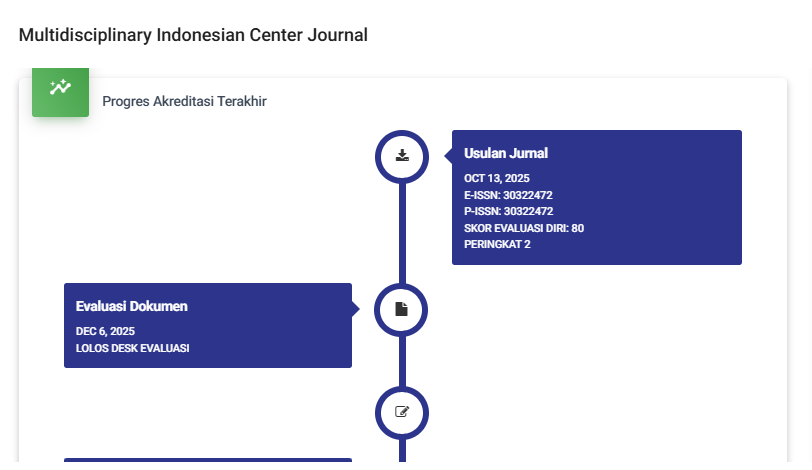EXPLOITATION OF NATURE AND SPIRITUAL DECADENCE: ETHICAL RESPONSIBILITY IN ISLAM THROUGH RITUAL AND RELIGIOSITY AS THE FOUNDATION OF HUMANITY
DOI:
https://doi.org/10.62567/micjo.v2i3.953Keywords:
Exploitation, Decadence, EcologicalAbstract
The large-scale exploitation of nature currently occurring in Indonesia reflects a crisis of spirituality among modern humans in their understanding and treatment of nature. The loss of sacred awareness of nature as God's creation has led to an exploitative, rather than participatory, relationship between humans and nature. This study aims to examine the connection between the exploitation of nature and spiritual decadence, as well as how Islamic values can provide a relevant and transformative ecological ethical framework. The method used is a qualitative study with a literature review approach, involving critical analysis of Islamic texts and spiritual ecology theories from thinkers such as Seyyed Hossein Nasr and Roy A. Rappaport. The results of the study show that Islamic principles such as Tawhid, Khilafah, Amanah, and Shari'ah have strong potential to shape spiritual-based ecological awareness. Additionally, rituals in traditional and religious communities also function as ecological and moral mechanisms. In conclusion, the reconstruction of Islamic spiritual values in an environmental context is essential to address contemporary ecological crises, particularly in Indonesia.
Downloads
References
Amir Sup, D. F. (2020). Mengawal Nilai-Nilai Produksi melalui AMDAL (Analisis Mengenai Dampak Lingkungan) dalam Perspektif Ekonomi Syariah. Tsaqafah, 16(1), 73. https://doi.org/10.21111/tsaqafah.v16i1.3953
Arifah, U., Hidayatullah, A. F., & Hariz, A. R. (2022). Program Eco-Pesantren Dalam Pelestarian Lingkungan. JURNAL KESEHATAN LINGKUNGAN: Jurnal Dan Aplikasi Teknik Kesehatan Lingkungan, 19(1), 105–114. https://doi.org/10.31964/jkl.v19i1.462
Aulia, O. D., Apriani, I., Juanda, A., Barri, M. F., Dewi, R. W., Muharam, F. N., Oktanine, B., Phoa, T. B., & Condro, A. A. (2023). Refining National Forest Cover Data Based on Fusion Optical Satellite Imageries in Indonesia. International Journal of Forestry Research, 2023. https://doi.org/10.1155/2023/7970664
Balabanski, V. (2024). Religion as Formation in Ecological Virtues BT - Religion Matters: Volume 2 : Further Explorations of Connectedness (P. T. Babie & R. Sarre (Eds.); pp. 9–21). Springer Nature Singapore. https://doi.org/10.1007/978-981-99-9777-0_2
Cloete, N. M. (2023). Retrieving a Christian ecological spirituality in response to our contemporary ecological crisis. Pharos Journal of Theology, 104(4). https://doi.org/10.46222/pharosjot.104.423
Database Peraturan BPK. (2020). Peraturan.Bpk.Go.Id. https://peraturan.bpk.go.id/Details/152706/perpres-no-109-tahun-2020
Devseshan, R. . (2024). FAMILY CAPITALISM AND THE EXPLOITATION OF NATURAL RESOURCES : A CATALYST TO CLIMATE CHANGE. EPRA International Journal of Socio-Economic and Environmental Outlook (SEEO), 11(11), 7–13. https://doi.org/10.36713/epra0314
Flores, C. (2019). The Disconnection Between Humans and Nature. Humans and Nature. https://humansandnature.org/the-disconnection-between-humans-and-nature/
Gaveau, D. L. A., Santos, L., Locatelli, B., Salim, M. A., Husnayaen, H., Meijaard, E., Heatubun, C., & Sheil, D. (2021). Forest loss in Indonesian New Guinea (2001–2019): Trends, drivers and outlook. Biological Conservation, 261(July), 109225. https://doi.org/10.1016/j.biocon.2021.109225
Global Forest Watch. (2024). https://www.globalforestwatch.org/dashboards/country/IDN/?map=eyJjYW5Cb3VuZCI6dHJ1ZX0%3D
Jusnaidi, N. F., & Marsuki, M. Z. (2016). Islamic Eco-Theology Vs Deep Ecology : an Outlook of. Jurnal Pengajian Islam, 8(June 2015), 112–130. https://www.researchgate.net/profile/Noor-Fazreena-Jusnaidi/publication/303330696_ISLAMIC_ECO-THEOLOGY_VS_DEEP_ECOLOGY_AN_OUTLOOK_OF_BASIC_PRINCIPLES/links/573d41a308aea45ee841ac2d/ISLAMIC-ECO-THEOLOGY-VS-DEEP-ECOLOGY-AN-OUTLOOK-OF-BASIC-PRINCIPLES.pdf
Madjid, N. (1999). Islam Doktrin dan Peradaban. In A. Maula (Ed.), Paramadina (4th ed.). Paramadina.
Muhammad, N. (2023). Mayoritas Penduduk Indonesia Beragama Islam pada 2022. In DataIndonesia.id.
Nasr, S. H. (1996). Religion and The Order of Nature. In Oxford University Press. Oxford University Press. http://scioteca.caf.com/bitstream/handle/123456789/1091/RED2017-Eng-8ene.pdf?sequence=12&isAllowed=y%0Ahttp://dx.doi.org/10.1016/j.regsciurbeco.2008.06.005%0Ahttps://www.researchgate.net/publication/305320484_SISTEM_PEMBETUNGAN_TERPUSAT_STRATEGI_MELESTARI
Peñuelas, J., Germain, J., Álvarez, E., Aparicio, E., Arús, P., Basnou, C., Blanché, C., Bonada, N., Canals, P., Capodiferro, M., Carceller, X., Casademunt, A., Casals, J., Casals, P., Casañas, F., Catalán, J., Checa, J., Cordero, P. J., Corominas, J., … Vinyoles, D. (2021). Impacts of Use and Abuse of Nature in Catalonia with Proposals for Sustainable Management. In Land (Vol. 10, Issue 2). https://doi.org/10.3390/land10020144
Putra, A., & Keluanan, Y. H. (2022). Dampak Kejatuhan Manusia terhadap Kerusakan Ekologi Menurut Kejadian 3. HUPERETES: Jurnal Teologi Dan Pendidikan Kristen, 3(2), 116–126. https://doi.org/10.46817/huperetes.v3i2.98
Rachmatullah, A., Lee, J. K., & Ha, M. (2020). Preservice science teachers’ ecological value orientation: A comparative study between Indonesia and Korea. Journal of Environmental Education, 51(1), 14–28. https://doi.org/10.1080/00958964.2019.1633989
Rappaport, R. A. (1968). Pigs for The Ancestors Ritual in The Ecology of a New Guinea People. In Yale University Press. Yale University Press. https://doi.org/10.1525/aa.1987.89.3.02a00550
Rappaport, R. A. (1999). Ritual and Religion in The Making of Humanity. In Cambridge University Press. Cambridge University Press. https://doi.org/10.1525/aa.2000.102.2.404
Sayem, M. A. (2023). Islam and Environmental EthicsEnvironmental Ethics: A Qur’anic Approach BT - Asian Spiritualities and Social Transformation (S. S.-M. KWAN & W.-Y. CHOW (Eds.); pp. 263–276). Springer Nature Singapore. https://doi.org/10.1007/978-981-99-2641-1_15
Strathern, A. J., & Stewart, P. J. (2021). Ritual Studies: Whence and Where to? BT - The Palgrave Handbook of Anthropological Ritual Studies (P. J. Stewart & A. J. Strathern (Eds.); pp. 1–14). Springer International Publishing. https://doi.org/10.1007/978-3-030-76825-6_1
Wardani, Y. A. (2024). The Phenomenon of Natural Resources Exploitation in Mencari Ujung Pelangi : An Ecocrtic Apporoach. Lakon : Jurnal Kajian Sastra Dan Buaya, 13(1), 9–19.
Downloads
Published
How to Cite
Issue
Section
License
Copyright (c) 2025 Irham Multazam, Binti Khalimatuzzahro, Ahmad Muttaqin

This work is licensed under a Creative Commons Attribution-ShareAlike 4.0 International License.



























